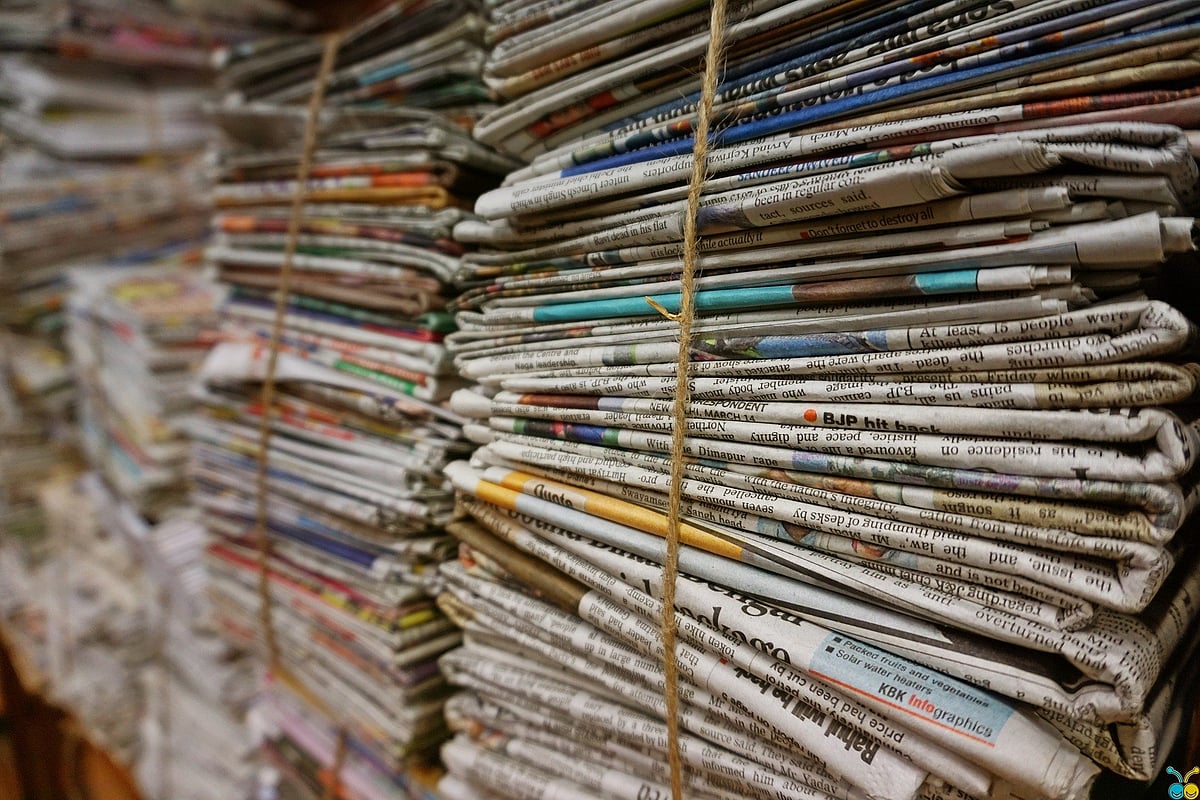The ongoing pandemic has impacted many a sector and sphere across the globe. It has transformed perceptions and brought about paradigm, nay, tectonic shifts in attitudes and approaches. One of the most affected verticals in these iffy times is print media, precisely the newspaper industry. A conventional newspaper in a tangible form and format has taken a back seat to pave the way for the online edition. This obviously engenders a pragmatic doubt as to the perceived end of a newspaper in its original avatar.
The naysayers are of the view that coronavirus has signed print media's death warrant and the prolonged pandemic has written a dirge on the 'death' of a newspaper. But as an avid newspaper reader with a Panglossian vision, I'd like to ask these Cassandras as to what makes them so cocksure about the departure of the old-fashioned but ever-relevant broadsheets? On what basis have they written a requiem on it, just by observing a temporary and transient shift to online editions of all tabloids and dailies? That print media has been temporarily usurped by online medium, doesn't spell the impending death-knell for the newspaper industry. The problem with all of us, especially with the overzealous Indians, is that we tend to get smitten and swept off by all new-fangled ideas and concepts. This euphoria soon evaporates just like the online education or silly webinars (who has coined this exasperating term?) have now relatively very few takers and viewers. Mind you, this enthusiasm for online education has petered out within a couple of months! The same can be said about the online newspapers. Agreed, they too will exist but as a comprehensive aside to the conventional newspapers.
Those, who're busy in writing the obituaries and epitaphs on the newspaper industry, are quick to adduce French philosopher and the father of modern Sociology Auguste Comte's Principle of Fizzling Out to buttress their point. According to this theory, humans tend to lose interest in a thing when it's not available to them for a rather long time. Since many newspapers in print format have not been around for quite some time and only their online versions are accessible, these wet-blankets are quick to bid au revoir (or in today's disgusting terminology, RIP; as if you're ripping someone!) to the dailies. This is also known as De-Addiction Syndrome in social trends.
These people should also bear in mind the Law of Formation, De-Formation and Re-Formation, propounded by yet another Frenchman Michel Foucault. According to this theory, a crisis, catastrophe or a cataclysmic occurrence re-shifts and back-shifts our priorities. To make it clearer, during the First World War (1914-1919) and the Second World War (1939-1945), newspaper industry all over the globe suffered a huge setback. Circulation of a great many newspapers got disrupted for inordinately long periods. Avid readers didn't get to read their favourite newspapers for months and years! Yet, when the Wars got over and the newspaper industry resumed its business, more readers began to read the print lines! Now those averse to reading newspapers in their conventional get up, may say that today's scenario is different because online or digital footprints can jolly well topple the print media. They're again mistaken. British newspaper The Independent, which had a Calcutta-born Indian editor, shut shop in 2016, but retained its online edition. The grapevine has it that, once the ongoing crisis is over, this elite broadsheet will again have its print edition along with online presence. Why? The reason is neuro-ophthalmological. While reading something online, eye-brain coordination creates REM-1 (Rapid Eye Movement-1) which tires and strains the eyes. The Osmosis-imbibing of the reading material through REM-1 is not smooth. It's frequently interrupted. When human brain skims through or cursorily glances through something, especially a linguistic or alphabetic text, on the screen, the neural acceptance level is quite low. Au contraire, when you hold a newspaper in your hands and read it, REM-2 (Regulated Eye Movement-2) makes it a relaxing and leisurely experience. Your brain imbibes the written words in a better and holistic manner. Words on pages and words on screens are diametrically different entities. The former has a greater assimilative capacity and a deeper intelligible quotient. That's the reason, Kindle and other online reading devices didn't succeed that much after the initial fanfare. One of the most cerebral Indian magazines, Caravan, still prefers print copies because its intellectual readers like to read its contents in a print and published format. Playboy, Penthouse and Forum aren't adored and preferred by their loyal readers in online format. These magazines are read and viewed leisurely in a conventional manner.
From a latero-cultural perspective, conventionalism is ingrained in all of us. Despite our ostensible fondness for all glitter and glare, we still give value to things that are time-honoured. That's our socio-psychological makeup. Newspapers fall in that category as it's time-tested and have been with the reading genres and generations for nearly 250 years. So, it has become our chromosomic character.
In contemporary Hellenic culture and Grecian refinement, a newspaper is a symbol of cultural elitism in modern Greece. The legendary Greek auteur Elia Kazan would ask a newcomer: Do you read a newspaper? A newspaper ennobles the mind and completes a person's persona. A recent research paper in a sociological journal published by a premier British university, underlines the benefits of reading a newspaper. According to the researchers, regular newspaper-reading gives a sense of comprehensive completeness to the reader/s. The encapsulated awareness provided by newspapers inculcates greater insights and deeper meanings to individualistic as well as collective consciousness. It keeps us abreast of the importance of printed words and leads to more reading and intellectual regurgitations. World's leading intellectual Yuval Noah Harari called newspapers, the modern scriptures. Verily, they're.
To encapsulate, the cognoscenti of conventional newspapers needn't worry. Once Covid-19 is consigned to the dustbin of history, newspapers will again emerge with a vengeance.
The writer is an advanced research scholar of Semitic languages, civilizations and cultures.




